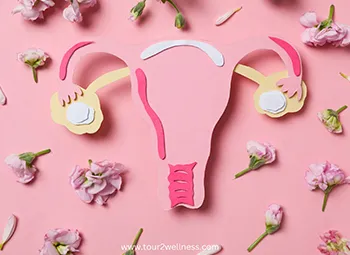
Taking care of your intimate hygiene is like giving your whole body a high five – it impacts your physical and mental well-being in powerful ways. Proper hygiene keeps infections and UTIs at bay, but it also goes beyond that. It can boost your confidence during your period, make working out more comfortable, and empower you to feel fresh and worry-free throughout the day.
Despite all these benefits, talking about women's hygiene can feel shrouded in secrecy or even shame. This blog is here to smash those barriers! We'll provide clear, straightforward information on essential hygiene practices, answer all the questions you might be too embarrassed to ask elsewhere, and help you develop a personalized routine that keeps you feeling healthy and confident.
Menstrual Hygiene
Women need to take care of their menstrual hygiene, which is very important for their health. If it’s not addressed properly, it can result in diseases or infections that limit their ability to go about their daily activities even at school. Educational process may be hampered by absence from class that is caused by poor menstrual management among girls. Having said that; when a woman practices proper menstrual hygiene, she is able to maintain self-respect through maintaining clean and feels comfortable all the time and hence able to engage in any other activities.Here are some key practices:
⦁ Regular Changing of Menstrual Products: Whether using pads, tampons, or menstrual cups, changing them regularly is essential to prevent infections. Ideally, every 4-6 hours is recommended.⦁ Proper Disposal: Used sanitary products should be disposed of responsibly. Wrapping them in paper before discarding helps maintain cleanliness.
⦁ Hygiene During Periods: Washing the genital area with water and mild soap can help prevent infections. Avoid using scented products that can disrupt the natural pH balance.
Vaginal Hygiene
It’s vital to understand that women should always maintain the cleanliness of their vagina if they want to avoid diseases or mere discomfort such as itching or smelling horribly. Although they ought to know that it is really unnecessary to overdo anything concerning their bodies, the truth still remains that; “vagina has a way taking care of itself”. In other words, there are friendly bacteria which live inside us protecting our bodies from harmful germs while at the same time maintaining their PH values at stable levels. And thus; never interrupt this ecological equilibrium through hard washing techniques.⦁ Gentle Cleansing: The vagina is self-cleaning. Use mild, unscented soaps and water for the external area. Avoid douching, which can upset the natural balance.
⦁ Breathable Fabrics: Wear cotton underwear and avoid tight clothing that can cause moisture build-up and irritation.
⦁ Proper Wiping: Always wipe from front to back after using the restroom to prevent bacteria from the anus from entering the vagina.

Daily Hygiene Practices
Daily hygiene routines are fundamental for overall well-being, laying the groundwork for a healthy body and a confident mind. Just like a clean canvas allows a masterpiece to shine, a clean and cared-for body allows you to move through your day with comfort and focus.By incorporating simple hygiene practices into your daily schedule, you're investing in your physical health by preventing infections and irritation, and boosting your mental well-being with a sense of freshness and self-care.
⦁ Showering: Regular showers help remove sweat, dirt, and bacteria. Focus on cleansing all body parts, especially areas prone to sweat.
⦁ Oral Hygiene: Brushing teeth twice a day, flossing, and using mouthwash help prevent dental issues and bad breath.
⦁ Hand Hygiene: Frequent handwashing, especially before eating or touching the face, can prevent the spread of germs.
Hygiene During Pregnancy
Pregnancy brings additional hygiene considerations as your body undergoes incredible changes. Increased discharge, hormonal shifts, and a growing belly all require adjustments to your routine. But don't worry, these tweaks are simple and can make a big difference in staying comfortable and healthy throughout your pregnancy. We'll delve into these changes, explore safe bathing practices to prevent slips, recommend breathable clothing options, and provide tips for maintaining healthy intimate hygiene during this special time.⦁ Increased Vaginal Discharge: Wear breathable, absorbent underwear and change them regularly to stay dry and comfortable.
⦁ Oral Care: Pregnancy can increase the risk of gum disease. Regular dental check-ups and maintaining oral hygiene are essential.
⦁ Hydration and Skin Care: Staying hydrated and moisturizing the skin can prevent dryness and stretch marks.
Personal Care Products
Choosing the right personal care products is crucial, especially for intimate hygiene, as this delicate area has a unique pH balance. Harsh soaps or products loaded with chemicals can disrupt this balance, increasing your risk of irritation and infections. Instead, opt for gentle cleansers formulated specifically for the vulva and vagina. Look for fragrance-free options with a pH level close to 3.5, which matches your natural balance. Remember, your intimate area is pretty amazing at taking care of itself – you just need to find products that work with it, not against it!⦁ Avoiding Harsh Chemicals: Choose products free from harsh chemicals, fragrances, and dyes that can irritate the skin.
⦁ Natural Ingredients: Opt for products with natural ingredients like aloe vera, chamomile, and tea tree oil, known for their soothing properties.
⦁ Eco-Friendly Options: Consider eco-friendly products like reusable menstrual cups, cloth pads, and bamboo toothbrushes to reduce environmental impact.
Tips for Maintaining Good Hygiene
⦁ Regular Medical Check-ups: Regular visits to the gynecologist and general physician help in early detection and prevention of health issues.⦁ Balanced Diet: A balanced diet rich in vitamins and minerals supports overall health and maintains skin and hair health.
⦁ Exercise: Regular exercise promotes good circulation, sweating out toxins, and maintaining a healthy weight.
Conclusion
Good feminine hygiene is one way through which a woman leads a healthy and confident life. It curbs infections, enhances self-esteem and leads to general well being when right hygienic practices are adhered to by the female members of society. Women’s hygiene needs to be openly discussed without fearing any taboos to enable creation of healthier societies.